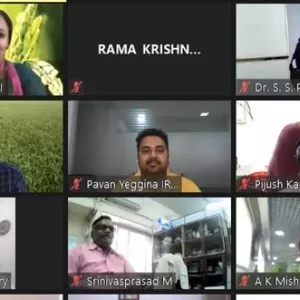Agriculture scientists brainstorming session focuses on the climate-smart management of rice-based systems in India
The Indian Council of Agricultural Research–Indian Institute of Rice Research (ICAR-IIRR) and International Rice Research Institute (IRRI) conducted a virtual brainstorming session on the development and deployment of low-cost, climate-smart, and site-specific strategies for improving productivity, profitability and resilience of rice-based production systems in India. Around 100 participants from various ICAR institutes and agricultural universities actively took part in Climate-smart

Agriculture scientists brainstorming session focuses on the climate-smart management of rice-based systems in India
The Indian Council of Agricultural Research–Indian Institute of Rice Research (ICAR-IIRR) and International Rice Research Institute (IRRI) conducted a virtual brainstorming session on the development and deployment of low-cost, climate-smart, and site-specific strategies for improving productivity, profitability and resilience of rice-based production systems in India.
Around 100 participants from various ICAR institutes and agricultural universities actively took part in Climate-smart management in rice-based systems of India: key learnings, research gaps and way forward for collaborative research , jointly organized by ICAR-IIRR and IRRI on 27 July.
The brainstorming session were conducted in four breakout groups (irrigated transplanted rice, favorable rainfed lowland, stress environment, and direct-seeded rice). In the breakout session, the participants were invited to discuss through the lens of the following sustainable development goals i.e. 2 (zero hunger), 3 (good health and well-being), 5 (gender equality), 13 (climate action) & 17 (partnership for the goals) on knowledge gaps in respective ecology, potential technologies and practices; future thrust areas for research, and potential partners and collaborators.
Prior to the brainstorming session, IRRI Representative for India Ranjitha Puskur and IRRI Sustainable Impact Platform Lead Jon Hellin, highlighted the emerging need for a consolidated teamwork in a multidisciplinary perspective to develop and fine-tune context-specific climate-smart management practices for ensuring the sustainability of rice-based systems. They emphasized the importance of interdisciplinary teams for adaptation and mitigation of climate change.
Dr. Puskur briefed the participating experts on the ongoing unification of agricultural research activities under One CGIAR to provide long-term food security for the growing world population under the threats of climate change. She stressed five areas—systems viewpoint, multidisciplinary networking, impact orientation, innovative approach, future thrust and plan, and mutual strength development—as key considerations for achieving sustainable development goals.
Dr. Hellin called for the development trajectories for combined…

